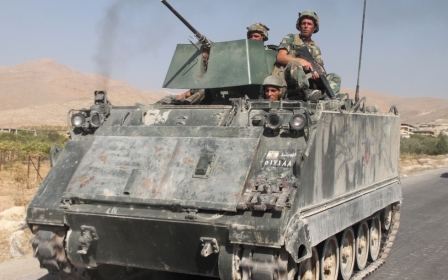Border blast was sending a 'message' to Israel: Hezbollah

Hezbollah was sending a “message” to Israel by planting a bomb that wounded two Israeli soldiers, a senior group figure has said.
"This is a message. Even though we are busy in Syria and on the eastern front in Lebanon our eyes remain open and our resistance is ready to confront the Israeli enemy," Hezbollah’s number two, Sheikh Naim Qassem told Lebanese OTV television late on Tuesday.
His comments came shortly after a bomb blast in the contested Shebaa farms, on the Lebanese-Israeli border, lightly wounded two Israeli soldiers.
Hezbollah-linked Al Manar television quickly took responsibility for the blast, explaining that it had been carried out in retaliation for the killing of an explosive expert who allegedly died in an Israeli air strike last month, while trying to dismantle a listening device.
It was the first time Hezbollah has claimed responsibility for an attack against the Israeli army since 2006, when the two sides fought a 34-day war. The war began after Hezbollah killed three Israeli soldiers and took two more captive, and then managed to kill the five-man army rescue team that tried to retrieve the captives.
Israel promptly lashed out at the Lebanese government and Hezbollah.
"The Lebanese government and Hezbollah are directly responsible for this blatant breach of Israel's sovereignty", army spokesman Lieutenant Colonel Peter Lerner said while also calling it at an act of "unprovoked aggression."
The Tuesday incident was the second in a matter of days. A Lebanese soldier was shot and wounded on Sunday after Israel claims it identified fighters trying to cross into its territory. It remains unclear what sparked the incident with UN peacekeepers urging both sides to show maximum restraint.
However, with Hezbollah bogged down in Syria where it is fighting alongside Syrian President Bashar al-Assad, analysts and commentators have been left wondering why Hezbollah would choose to react now, especially a month after the alleged provocation.
“Why did [Hezbollah] wait a month? And if it is so eager to exact revenge, then why has it not yet done so for the 2008 death in Damascus of its operations chief, Imad Mughniyeh, in what is widely believed to have been a Mossad hit?,” Haaretz columnists Israeli Anshel Pfeffer wrote on Wednesday.
“And why publicise the fact that it was its men who laid the IEDs [improvised explosive device] when in the past it stayed mum?”
Former Lebanese Prime Minister Saad Harriri, a firm opponent of Hezbollah, has firmly condemned the blast.
“The insistence on weighing such options, whether they were made randomly or calculated on foreign agendas, does not only contribute to disrupting national efforts in the fight against terrorism and extremism, but again raises the issue of exiting national consensus to act [unilaterally] ... in the country,” Hariri said in a statement, while calling on Hezbollah and its March 8 allies to not allow “the wars of others on our land or in the wars on other’s territory.”
Hariri, is son of former Prime Minister Rafik Hariri who was killed in a massive explosion in 2005 that has since been linked to Hezbollah operatives in the country.
“Using the border as a platform for military and security messages is a new adventure and a step into the unknown; and does not add to Lebanon any power source,” Hariri added.
“It is time to weigh the risks arising from [such actions] and devote efforts in all directions to protect the state from the power vacuum and seek an agreement immediately to end the presidential vacancy and build a new stage of national cohesion.”
Lebanon’s Parliament Speaker Nabih Berri, who heads Lebanon’s Shiite Amal Movement and is close with Hezbollah, also commented on the blast, although he seemed to downplay its significance, instead choosing to place the blame on Israel.
"Before answering this question, let me ask about the Israeli enemy’s blatant violations [of Lebanese sovereignty] and the recent attack against the Lebanese Army that took place in front of UNIFIL’s eyes,” Berri was quoted as telling visitors late Tuesday when asked to comment on the incident.
“In any case, we are seeking answers to the ongoing Israeli violations. We got used to the fact that all hell breaks loose whenever an Israeli is wounded, while no one raises a question over the ongoing attacks on Lebanon and on Lebanese civilians and military personnel.”
Waddah Sharara, a sociology professor at the Lebanese University of Beirut, has described the attack as carefully planned and orchestrated.
"Hezbollah wants to show its base that it can still hold its own against Israel and to say loud and clear that it can act on several fronts," Sharara told AFP.
On Sunday, eight Hezbollah fighters were killed in clashes with al-Nusra Front militants in eastern Lebanon, in the latest incident that saw the group targeted for supporting Assad's regime.
Sharara said the Tuesday incident on the ceasefire line between Lebanon and Israel appeared to be isolated.
"I think it was a case of a totally controlled skirmish and there is no indication that one side or the other intended to escalate. Hezbollah is afraid of setting off an uncontrolled and uncontrollable process."
Stay informed with MEE's newsletters
Sign up to get the latest alerts, insights and analysis, starting with Turkey Unpacked
Middle East Eye delivers independent and unrivalled coverage and analysis of the Middle East, North Africa and beyond. To learn more about republishing this content and the associated fees, please fill out this form. More about MEE can be found here.




